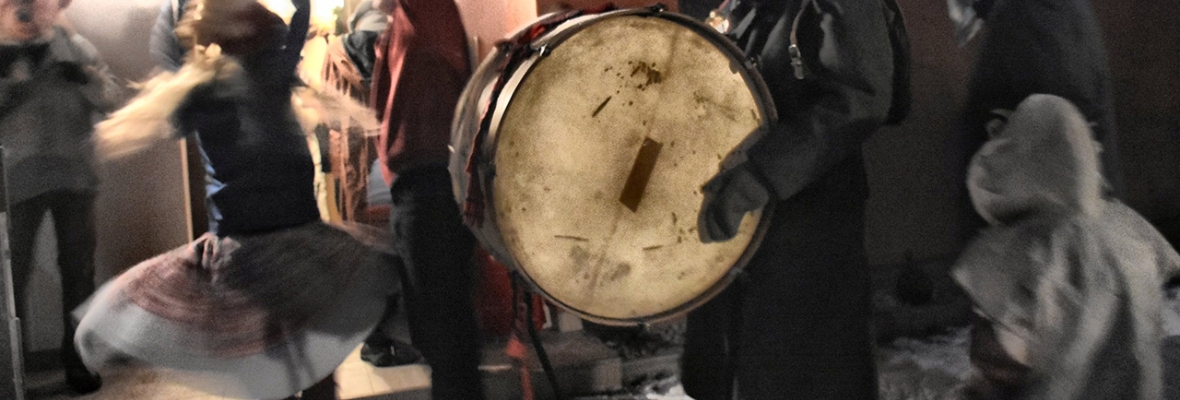
Department of Ethnomusicology and Ethnochoreology
Department of Ethnomusicology and Ethnochoreology
Music and dance are among the higher needs of human beings and can be considered as cultural universals. Although there are countless conceptualisations of dance and music, defined by the British ethnomusicologist John Blacking as "humanly organised sound", it is impossible to find a human community on a global scale in which there are not forms of musical and dance expressions whose meaning can be social, cognitive, aesthetic, spiritual, or even power. Music and dance are a distinctly individual bodily experience for their producers and recipients, involving a range of physiological aspects that have a positive effect on the human organism (not to mention the fact that music can also be used to induce extreme psychological and physical discomfort). In relation to the physical anchoring of psychological experiences, the emotions that people experience when singing and dancing play a role. However, music and dance always have a social and sociogenic dimension. In music and dance activities, people come together, not only to form and maintain differently defined communities, but also to exclude each other. Finally, music and dance have profound symbolic meanings and must be approached as a significant human action and a non-negligible aspect of a wide range of socio-cultural and political processes and phenomena (just to name a few, processes of identification; mobility and reterritorialisation; situatedness and positionality of marginalised communities; neo-colonialism; transnationalism; conventional and new religious expressions; conceptualisation of cultural heritage; construction of memory and forms of remembering; gender and corporeality; trauma, but also wellbeing and therapeutic practices). Through specialized insight, ethnomusicology and ethnochoreology provide an additional dimension to ethnological-anthropological understanding of the whole mosaic of issues under investigation.
Current and prospective research agenda for basic and applied research:
- Folklore revivalism, politics, memory, heritization and sustainability in early post-socialist and recent socio-cultural contexts
- Musical and dance activities of minorities and marginalized groups, foreign and expatriate communities predominantly in the Czech Republic, Slovakia, Austria and the USA; identification, integration and positionality towards the homeland and the host society
- Urban festivals and folk festivals at the border of urban and rural space; negotiation of place identity through music and dance; material cultural heritage in relation to invention and reinterpretation of disappeared identities, forms of re-establishing and strengthening local identities
- Research on informal music and dance expressions in the context of everyday life, while maintaining trans-genre perspectives
- Analysis and (re)interpretation of historical sources of folk music, developing the possibilities of an online analytical database of folk music and dance culture and linking with similar databases abroad; preparation of critical editions using the frameworks of digital humanities and applied ethnomusicology
- Basic and applied ethnomusicology and ethnochoreology in the context of community formation and sustainability, integration processes, resilience and wellbeing, and the supportive therapeutic potential of music and dance
- Visual ethnomusicology and ethnochoreology; preparation and realization of visual studies and time-lapse documentaries (Stories of Prague Mardi Gras, collective visual study of the South Bohemian Konopicka festival, commemoration of the identity of the disappeared and rediscovered cultural heritage of the Třebíč Jewish quarter and other sites)
- History of the field and the knowledge production in musical folkloristics and ethnomusicology; tracing the trajectory of the constitution of ethnochoreology in the Czech environment as an applied discipline under the authoritarian regime of communist Czechoslovakia and in relation to the folklore revival movement
KRATOCHVÍL, Matěj, PhD.
NUSKA, Petr, Mgr., Ph.D.
STAVĚLOVÁ, Daniela, doc., Mgr., CSc.
SKOŘEPOVÁ, Zita, Mgr. Ph.D.
TYLLNER, Lubomír, doc., PhDr., CSc.
VEJVODA, Zdeněk, PhDr., PhD.
Folklore revival in post-socialist countries: politics, memory, heritization and sustainability (Lead Agency International Project, Czech Science Foundation)
Text structure of the Czech folk songs from the turn of the 18th and 19th centuries (Czech Science Foundation)
Folk song and dance of the Czech lands - digital system for presentation and preservation; NAKI (Ministry of Culture)
Weight and Weightlessness of the Folklore: The Folklore Movement of the Second Half of the 20th Century in Czech Lands (Czech Science Foundation)





